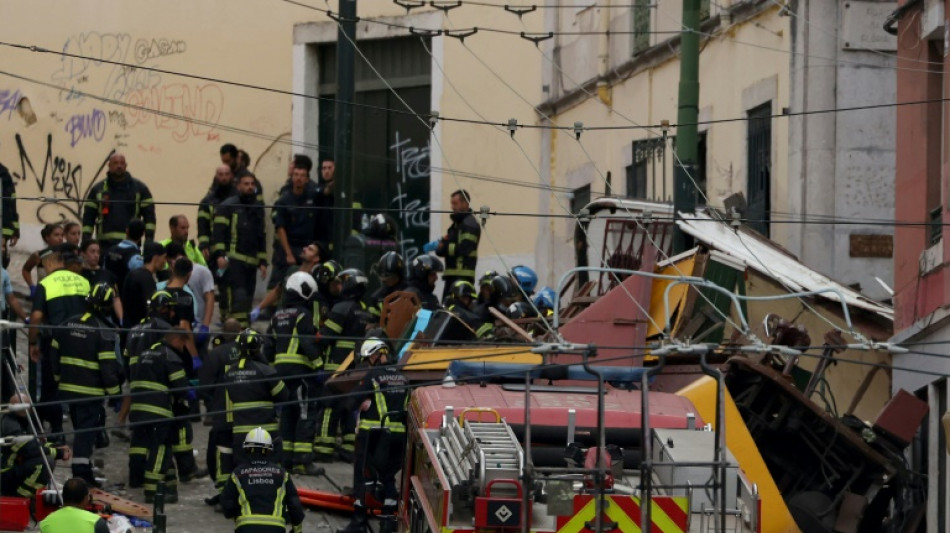
Portugal holds day of mourning as crash toll rises to 17 dead

Portugal held a day of national mourning on Thursday as the death toll from the derailment of one of Lisbon's iconic funiculars rose to 17 people, with 21 injured.
The accident Wednesday evening in one of the capital's most popular tourist spots saw the yellow Gloria funicular veer off a steep stretch of tracks near Liberty Avenue and crash into a building.
At least 11 foreigners were among the injured -- two Germans, two Spaniards, a Frenchwoman, an Italian, a Swiss national, a Canadian, a South Korean, a Moroccan and a person from Cape Verde, emergency services said, updating the death toll, which previously stood at 15.
The identities of the victims were not immediately available. Fifteen people -- eight men and seven women -- were killed instantly and two people died later.
Authorities halted Lisbon's three other funiculars "to check the conditions and safety of their operations", said municipal civil protection spokeswoman Margarida Castro.
The German foreign ministry said its Lisbon embassy was working with local authorities on identifying the victims.
"Unfortunately, we must assume that German citizens are also among those who have been affected. There is currently no reliable information on the number," it told AFP.
The Observador news website cited a police source as saying that a German man was killed, his wife was in a critical condition and their three-year-old child slightly injured.
An emergency services official confirmed that a three-year-old had been injured but did not specify the nationality.
- 'Like a cardboard box' -
Footage showed police and rescue personnel working into the night around the mangled funicular, which was left lying on its side against a wall of the street.
A woman interviewed by television channel SIC said the train, which can hold about 40 people, struck the building "with brutal force and collapsed like a cardboard box".
Images after the accident showed another funicular stopped a few metres (yards) away on the tracks as tourists and onlookers watched, stunned.
Lisbon Mayor Carlos Moedas called the incident "a tragedy that our city has never seen".
A statement by the office of Prime Minister Luis Montenegro said it had "brought grief to... families and dismay to the country", and European Union chief Ursula von der Leyen offered condolences to the victims' families.
Lisbon prosecutors said they were opening an investigation.
The city's public transport operator said it had complied with "all maintenance protocols".
"Everything was scrupulously respected," Pedro Bogas, the head of Lisbon Carris, said at the site of the accident, adding that maintenance of the funiculars has been done by a contractor for the past 14 years.
General maintenance is carried out every four years, and was last conducted in 2022, Carris said. Intermediate maintenance takes place every two years and was completed in 2024.
Antonio Javier, a 44-year-old Spanish tourist, told AFP his family were "a little relieved" to have skipped taking the funicular because the queue was too long.
The Gloria first entered into service in 1885 and was hooked up to electricity in 1915, according to the website of Portugal's national monuments.
Z.Kaczmarek--GL

 London
London

 Manchester
Manchester
 Glasgow
Glasgow
 Dublin
Dublin
 Belfast
Belfast
 Washington
Washington
 Denver
Denver
 Atlanta
Atlanta
 Dallas
Dallas
 Houston Texas
Houston Texas
 New Orleans
New Orleans
 El Paso
El Paso
 Phoenix
Phoenix
 Los Angeles
Los Angeles



